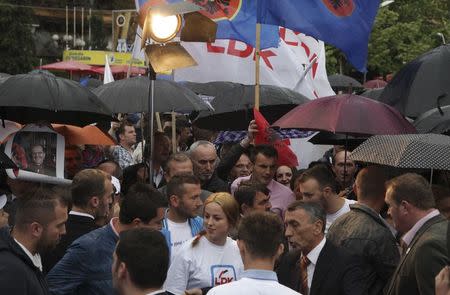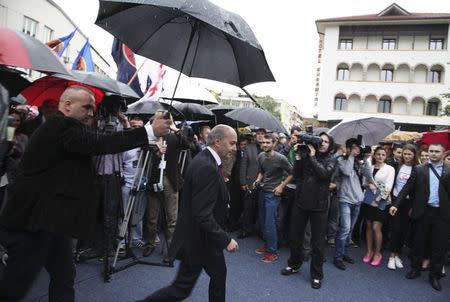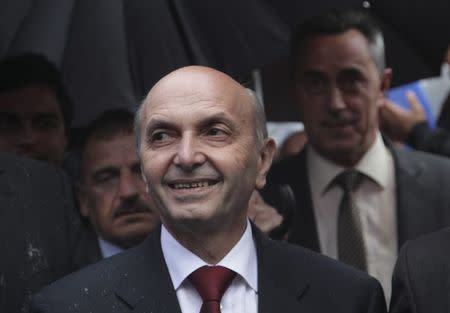Kosovo votes under shadow of war crimes probe
By Fatos Bytyci GJAKOVA Kosovo (Reuters) - Hashim Thaci's "thumbs-up" gesture has become his trademark in election campaigns since he helped lead the guerrilla insurgency to throw off Serbian rule over Kosovo 15 years ago. The thumbs were on show again this week in the western town of Gjakova, where 46-year-old Thaci was on the campaign trail ahead of an election on Sunday he hopes will give him a third term as prime minister. The show of confidence, however, belies the pressure on Thaci from political rivals and a war crimes investigation that threatens to ensnare former comrades-in-arms and even his closest allies. Whoever wins on Sunday, attention will turn quickly to an ad hoc tribunal to be created under European Union auspices to try those responsible for the alleged harvesting of organs from Serb prisoners-of-war during the 1998-99 conflict. The findings of a special EU-appointed task force investigating the allegations are expected to be published "before the summer period", a Western diplomat told Reuters. Another said the report had been delayed from early June to avoid disrupting the election. Kosovo Albanian leaders, many of them drawn from the ranks of the guerrilla Kosovo Liberation Army (KLA), call the probe a bid to tarnish their struggle for freedom from Slobodan Milosevic's Serbia, a fight that NATO bombing helped them eventually win. "We have nothing to hide from our friends and partners," Thaci told Reuters in Gjakova, where the historic Ottoman market quarter was painstakingly restored after it was razed by Serb paramilitaries at the end of the last century during a brutal counter-insurgency war. "Even before, there were accusations from The Hague (war crimes) tribunal, and KLA commanders prevailed against injustice and slander. The war of the Kosovo people was a just war." Prosecutors and diplomats say efforts to investigate war crimes allegedly committed by the KLA have run into witness intimidation, a culture of reverence for the former guerrillas and deep clan loyalties. The organ harvesting allegations hit the headlines in 2011 with publication of an explosive report by Council of Europe rapporteur Dick Marty. He alleged that Thaci and four high-ranking members of the prime minister's Democratic Party of Kosovo (PDK) had been part of a group involved in the sale abroad of organs removed from Serb prisoners who had been smuggled out of Kosovo to a makeshift clinic in Albania during the war. TRIBUNAL ABROAD Thaci says the accusations are an outrage, but – under Western pressure – his government has agreed to the creation of an ad hoc tribunal. All four of his party allies named in the report are running for parliament on Sunday. One of them, Kadri Veseli, was beside Thaci as he stepped out a black BMW jeep in Gjakova. Due to concerns over how to protect witnesses and the reliability of courts in Kosovo, the tribunal will sit abroad, possibly in the Netherlands. It will apply Kosovo law, but the judges and prosecutors will be foreigners. "We have said that we expect to announce the outcome of our investigation in the coming months, and we maintain this," said a spokesman for the EU-appointed task force, which is led by U.S. prosecutor John Clint Williamson. "The operational work is ongoing and progressing as planned." Pursued doggedly by Serbia, the question of the organ harvesting allegations has become a matter of credibility for the EU's efforts to instill the rule of law in Kosovo through its biggest foreign mission, known as EULEX. The mission deals with cases of war crimes, corruption and organized crime. To many among Kosovo's 90-percent ethnic Albanian majority, the accusations are an insult. Hundreds of thousands were driven from their homes in 1998-99 by Serbian forces, during Slobodan Milosevic's last throw of the dice after the wars in Croatia and Bosnia during the collapse of the Yugoslav federation. An estimated 10,000 people died, most of them Albanians. NATO intervened with air strikes against Serbia before Kosovo became a ward of the United Nations. The landlocked territory of 1.8 million people declared independence in 2008 with the backing of the West and has been recognized by more than 100 countries since. NATO still has 5,000 soldiers there. Despite signs of a thaw with Serbia, Kosovo's former master says it will never recognize its former southern province as sovereign, and Belgrade's big-power ally Russia is blocking the new country's accession to the United Nations. Even without the added headache of the tribunal, Thaci's popularity has taken a hit as frustrations grow among Kosovo Albanians over widespread corruption, nepotism and poverty after six years of PDK rule. Thaci fought back with a 25-percent public sector pay rise just two months before the election. Opinion polls, which are not generally reliable, give the PDK a thin lead over its long-time rival, the Democratic League of Kosovo (LDK). If the PDK wins, it will come under immediate Western pressure to pass the necessary laws and constitutional amendments to create the tribunal on foreign soil. "Kosovo should not feel ashamed of the court," Britain's ambassador to Kosovo, Ian Cliff, told Reuters in emailed comments. "I have often said that only those with something to hide need fear justice." (Writing by Matt Robinson; editing by Andrew Roche)

 Yahoo News
Yahoo News 


